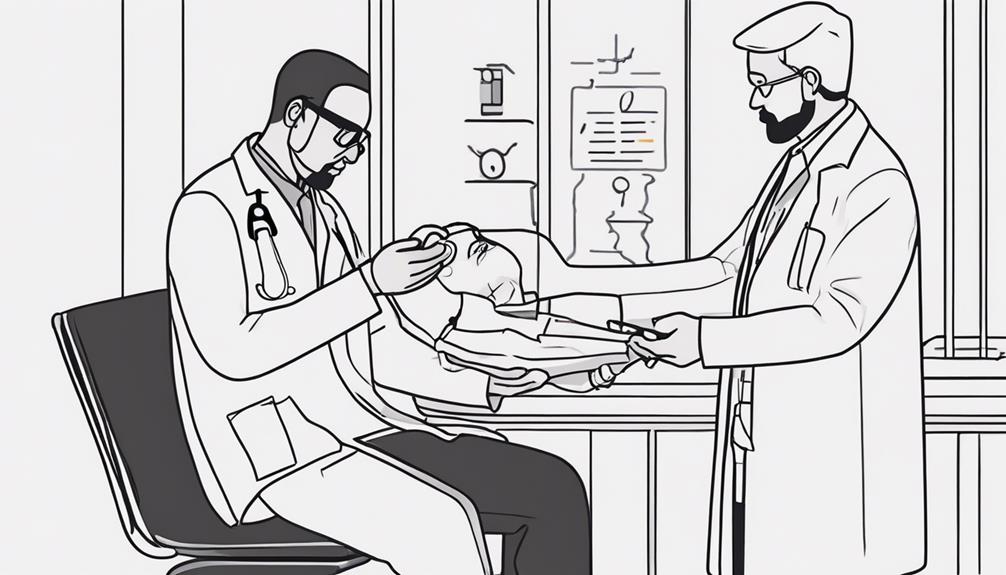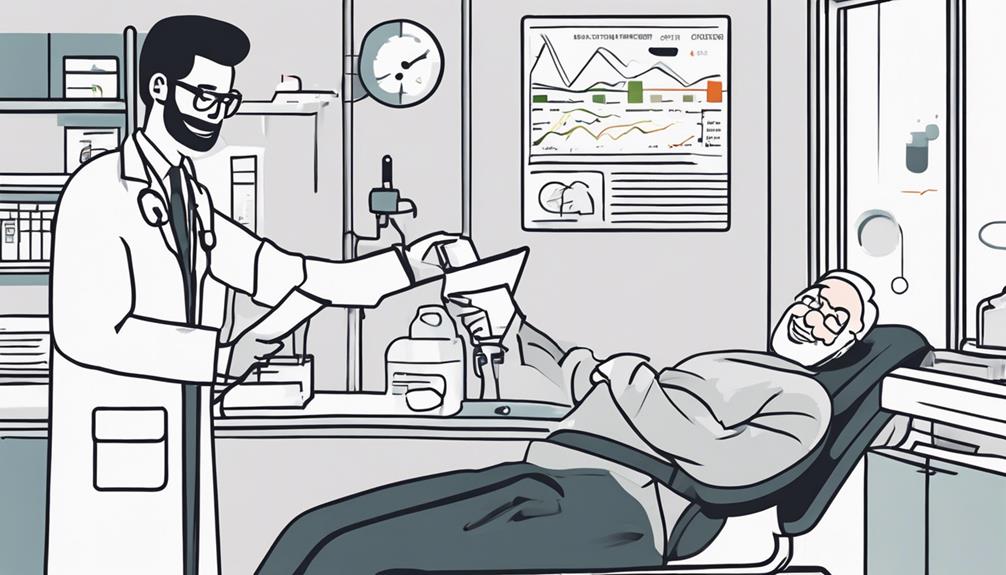Did you know that regular diabetes health check-ups can uncover potential complications that may go unnoticed otherwise?
By staying proactive and monitoring your health consistently, you can significantly enhance your overall well-being and quality of life.
Discover how these routine check-ups provide you with valuable insights into your health status and enable you to make informed decisions about managing your diabetes effectively.
Key Takeaways
- Early detection of complications ensures timely interventions for effective diabetes management.
- Improved disease management through regular monitoring of blood sugar levels and lifestyle modifications.
- Prevention of health risks by monitoring diet, engaging in physical activity, and adhering to medications.
- Personalized treatment strategies enhance adherence, address risk factors, and improve overall well-being.
Early Detection of Complications

Regular diabetes health check-ups play a crucial role in the early detection of complications associated with the condition. Preventive care through these check-ups enables timely intervention, which is key to managing diabetes effectively. By monitoring blood sugar levels, blood pressure, cholesterol, and kidney function regularly, healthcare providers can identify any deviations from the norm promptly. This allows for early intervention strategies to be implemented, potentially preventing the progression of complications such as diabetic neuropathy, retinopathy, nephropathy, and cardiovascular issues.
Timely intervention can significantly impact the course of the disease and improve outcomes. For instance, if high blood sugar levels are detected early on, adjustments can be made to the treatment plan to bring them back under control. Similarly, identifying elevated blood pressure or cholesterol levels in the early stages allows for interventions such as lifestyle modifications or medication adjustments to prevent further damage to organs like the heart and kidneys. Regular check-ups empower individuals with diabetes to take proactive steps towards managing their health effectively.
Improved Disease Management
To enhance disease management for individuals with diabetes, prioritizing comprehensive care strategies beyond routine health check-ups is essential. Disease monitoring plays a crucial role in managing diabetes effectively, allowing for timely interventions and adjustments. Additionally, lifestyle changes are key to controlling blood sugar levels and reducing the risk of complications.
Here are four essential strategies to improve disease management:
- Regular Blood Glucose Monitoring: Consistent monitoring helps you understand how your body responds to different foods, activities, and medications.
- Healthy Eating Habits: Adopting a balanced diet rich in fruits, vegetables, whole grains, and lean proteins can aid in managing blood sugar levels.
- Regular Physical Activity: Engaging in regular exercise helps improve insulin sensitivity, control weight, and lower blood sugar levels.
- Medication Adherence: Taking prescribed medications as directed by your healthcare provider is crucial for managing diabetes effectively.
Prevention of Health Risks

Preventing health risks associated with diabetes requires proactive measures to maintain optimal well-being and reduce potential complications. Two key components in managing diabetes and preventing associated health risks are diet control and maintaining an exercise routine.
Diet control plays a crucial role in managing diabetes. Monitoring carbohydrate intake, choosing foods with low glycemic index, and incorporating ample fruits and vegetables can help regulate blood sugar levels. Additionally, controlling portion sizes and avoiding sugary beverages and high-fat foods are essential in diabetes management.
Alongside diet control, maintaining an exercise routine is equally important. Regular physical activity can help improve insulin sensitivity, lower blood sugar levels, and manage weight. Incorporating aerobic exercises like walking, cycling, or swimming, along with strength training exercises, can have a significant impact on diabetes management.
Personalized Treatment Strategies
Implementing personalized treatment strategies is essential in effectively managing diabetes and optimizing health outcomes. Individualized care tailored to your specific needs can lead to better blood sugar control and overall well-being. When it comes to diabetes, targeted therapies play a crucial role in addressing the root cause of the disease and mitigating complications.
Here are four key benefits of personalized treatment strategies:
- Precision Medicine: By analyzing your unique genetic makeup and lifestyle factors, healthcare providers can prescribe medications and interventions that are most effective for you.
- Risk Reduction: Personalized treatment plans can help identify and address potential risk factors early on, reducing the likelihood of developing complications associated with diabetes.
- Improved Adherence: Tailoring treatment to suit your preferences and lifestyle increases the likelihood of adherence to medication regimens and lifestyle modifications.
- Enhanced Quality of Life: Individualized care focuses on improving not just physical health but also emotional well-being, leading to an overall better quality of life for individuals managing diabetes.
Long-Term Health Benefits

By focusing on personalized treatment strategies, individuals with diabetes can experience a multitude of long-term health benefits that contribute to improved overall well-being and disease management. Preventing complications is a key aspect of long-term health benefits for individuals with diabetes. Regular health check-ups enable healthcare providers to monitor progress closely, identify any signs of complications early on, and take necessary steps to prevent them from worsening.
By staying proactive through regular check-ups, individuals can significantly reduce the risk of developing serious complications associated with diabetes, such as heart disease, kidney damage, nerve damage, and vision problems. Monitoring progress through these check-ups also allows for timely adjustments to treatment plans, ensuring that individuals are receiving the most effective care tailored to their specific needs.
Frequently Asked Questions
What Are Some Common Misconceptions About Diabetes Health Check-Ups?
Misconceptions about diabetes health check-ups might lead to neglecting prevention. Understand the importance of regular screenings for early detection. Increase awareness of the role these check-ups play in managing diabetes effectively and avoiding complications.
How Often Should Individuals With Diabetes Schedule Health Check-Ups?
You should schedule health check-ups at least every 3 to 6 months for proper health monitoring. This frequency ensures timely intervention and adjustment of treatment plans, helping you manage your diabetes effectively and prevent complications.
Are There Any Specific Lifestyle Changes Recommended After a Diabetes Health Check-Up?
After a diabetes health check-up, you may be advised to make dietary modifications like reducing sugar intake and increasing fiber. You might also need to establish regular exercise routines to manage blood sugar levels effectively.
Can Diabetes Health Check-Ups Detect Other Health Conditions Besides Diabetes-Related Complications?
Coincidentally, regular diabetes health check-ups serve as a gateway to early detection and prevention of other health conditions. These screenings can identify comorbidities, allowing for timely intervention and comprehensive management to improve overall health outcomes.
How Can Individuals With Diabetes Advocate for Themselves During Health Check-Ups to Ensure They Receive Comprehensive Care?
Advocacy strategies and communication techniques are key. Be assertive about your concerns, ask questions, and share your symptoms. Request regular screenings for related conditions. Ensure your healthcare team understands your holistic needs for comprehensive diabetes care.
Conclusion
Regular diabetes health check-ups are crucial for early detection of complications, improved disease management, prevention of health risks, personalized treatment strategies, and long-term health benefits.
By staying proactive and informed about your health status, you can make necessary adjustments to your lifestyle and treatment plan to maintain optimal health.
Don't wait for symptoms to arise; prioritize regular check-ups to ensure you're effectively managing your diabetes and reducing the risk of complications.